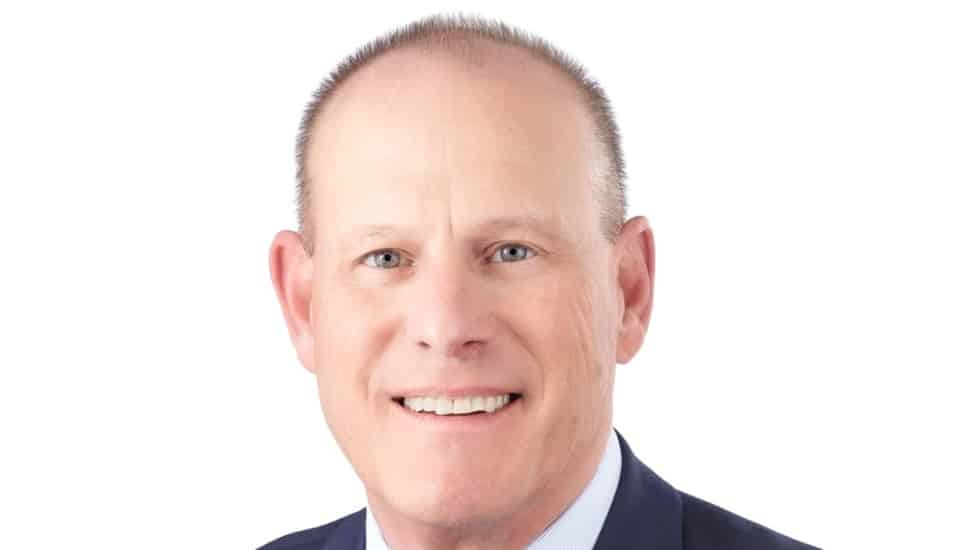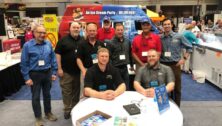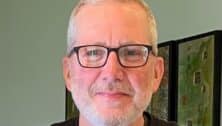Chester County Leadership: Rodger Levenson, Chairman, President, and CEO of WSFS Bank

Rodger Levenson, Chairman, President, and CEO of WSFS Bank, spoke with VISTA Today about growing up in Broomall, where he loved riding bikes and playing sports with friends in his neighborhood. As a teenager, he learned about teamwork and discipline by working at a hotel and as a Camp Counselor.
Levenson recalled how he got his business degree at Temple University and worked his way up in the banking world with the help of several supportive managers. He also shared why he wasn’t planning to be a CEO and how WSFS is filling a niche in a market filled with big banks.
Where were you born, Rodger, and where did you grow up?
I was born and raised the youngest of two kids in Broomall. When my parents bought our house in the late 1950s, they had pictures of West Chester Pike, and it was a dirt road with a trolley car going down the middle.
What did your parents do?
My mother was an educator, guidance counselor, and her last career stop was as a Dean of Students at Rosemont College. My dad was in the insurance business. He had his own insurance brokerage.
What do you remember about growing up in Broomall?
We lived on a street with great families and lots of kids. We were always out in the street, playing sports, out at night, and riding bikes. It was a very warm community. Everybody seemed to get along and supported each other. The houses were open, we spent holidays with each other, all those kinds of things.
The other thing I remember is that I rode my bike everywhere. I rode my bike to school, to play sports. It was a different time and place. As a kid, you could just get on your bike and go do your thing.
Did you play any sports in high school or as a kid?
I played a lot of hockey and basketball, but in the street and the driveway. I went to Marple Newtown High School and graduated in ’79, and the class back then was over 800 people. So, you had to be very good and start at a young age to play high school sports.
What did you do in high school to distinguish yourself? Or did you just go to class and get through it?
I think it’s more the latter. I had a great education, a great time, but Marple Newtown High School was so big that it was hard to stand out. I focused more on being social than trying to do anything different or special.
Did you have any jobs in high school?
The most memorable job was at what is now the Radnor Hotel. Back then, it was called the St. David’s Inn. I worked there for a couple of years. I was the gopher; if you needed somebody to take your bags up, if you needed room service, if they needed help in the kitchen — whatever it took, I did it.
In addition, when I was growing up, I went to an overnight camp. And then, after that, I worked there a bunch of summers as a Camp Counselor.
What do you think you picked up from those jobs that influence how you work today?
One is that if you don’t put yourself out there, nothing’s coming at you. I wouldn’t say my parents pushed me, but they nudged me pretty hard. They told me, “It’d be a good idea to get a job.” I went up and down West Chester Pike and knocked on doors.
The other thing was I learned time management, discipline and being part of a team. There was a small group of us when I was on shift there that made sure everything worked well. A big part of that was figuring out what needed to get done. I never showed up and there was a list. Most of the time, I showed up and reported to whoever was the manager and would just have to figure it out.
What about music? You can’t have grown up when you grew up without music playing a role.
I loved music, particularly rock music. I went to some concerts even when I was in high school, which was always an unbelievable experience. My first concert at The Spectrum was Bad Company.
Was there an artist that stands out that inspired you?
I was always a big Bruce Springsteen guy. But it was pretty varied. I didn’t have one particular artist or genre that I followed.
I’m guessing you were a pretty good student. Where did you end up going to college?
I went to Temple University. I went away the first semester somewhere else, but it didn’t work out, so I ended up coming back and transferring to Temple.
What drew you to Temple University?
I wanted to be in the city. Temple had a great reputation, including the business school, which is where I was. I also liked the idea of working and doing other things while I was going to college.
It was a great experience. The trade-off was that I lived at home because, back then, very few students lived on campus. I commuted every day, taking the El and the Broad Street Subway up there. It allowed me to do some things that, if I was away, I wouldn’t have done.
On the other hand, I missed the experience of living away and being in a fraternity and that kind of stuff. But I wouldn’t have traded anything. It was a great experience.
You mentioned that you did some other cool things while you were in college. What were they?
Probably the most interesting thing was that I knew somebody who had connections at the Big 5 when they played at The Palestra. I was a big basketball junkie. I asked him if he could introduce me to anybody there. And again, they needed a gopher. Almost every year of college, I worked there during the games, helping with stats, helping with the media, doing all kinds of stuff, sitting literally courtside for all those unbelievable doubleheaders and tripleheaders.
I got to know a lot of the people who worked in the press. The guy who worked for the Associated Press said to me one day, “The guy who covers the Flyers for us can’t make it tonight. Can you go down there and do it?”
After every period, you would call somebody in New York and give them the information on the stats and the goals. They would write a little story that would go out on the newswire. And after the game, they would ask me to get a quote or two from the stars of the game.
One time, they played the Buffalo Sabres and the Sabres won, so they asked me to get a quote from a player on the Sabres. I wandered down to the locker room, asking everybody questions. What I didn’t realize is that everybody would be getting changed, and without their jerseys on, I had no idea who was who.
I did that for at least three or four years, past college. I would have never had experiences like that if I had gone away to school. It was cool because I got paid to go to every single game, and I learned a skill. But after working for a year or two, I started grad school and it was just too many things to juggle.
Where did you end up going to grad school?
I went to Drexel at night. I was very focused on getting work experience while I was going to school. I was working in Center City at that time, so Drexel was a natural fit.
Where did your work ethic come from?
My parents both worked extremely hard, multiple jobs. They led by example. They never said, “You have to do this, you have to do that.” But I learned pretty quickly that nothing in life comes by sitting on the couch, so I got busy doing stuff.
Over the course of your career, who were some of the people who saw promise in you and opened up doors?
After graduating undergrad, it took about a year for me to land a job that was more permanent. I became a Credit Analyst at a commercial finance company, which I really enjoyed. It was a great learning experience, but it was a small operation.
I had wanted to get into banking as an undergrad. This was back when all the big banks in Philadelphia had these high-profile training programs where you would come in as an undergrad, do a two-year rotation, and then they would find a place for you. I applied and I didn’t get in anywhere. My goal was always to figure out a way to get back into banking. That’s why I was doing the Credit Analyst job.
I saw a similar job in the newspaper on a Sunday at the Philadelphia National Bank. I applied for the job and got called for the interview. The guy who interviewed me, Dan Aboyan, who I’m still friendly with to this day, was like, “I think you’re overqualified for the job.” I said, “I just want a chance to get into a big company with lots of opportunities to learn.” And so he hired me. He was the guy that really opened the door for me.
There were a number of managers throughout that period of time who were supportive and gave me the opportunity to do special projects and grow. All of them, to this day, are people that I stay in touch with.
Was there one manager that stood out as special in your career, Rodger?
There’s so many guys I admired. One was a guy by the name of Paul Geraghty. As I was getting going in my career, he was very helpful to me and continues to be a friend and a mentor today.
And my predecessor here at WSFS is Mark Turner. I learned an incredible amount from both of them, and both of them opened doors and got me to where I am today. I wouldn’t be CEO if I didn’t have Mark’s support.
What are your priorities for 2024?
WSFS is 192 years old. The greater Philadelphia/Delaware region hasn’t had a bank that’s large, locally headquartered, and exclusively focused on this market since probably CoreStates in the early ‘90s.
Although it wasn’t designed this way, when I came to WSFS, it really started to grow under Mark’s leadership. We saw this opportunity to fill a void in the market because it’s filled with big national banks. We embarked upon a multi-year process, which culminated with the acquisition of Beneficial Bank and Bryn Mawr Trust. Starting in 2019, we tripled the size of the company, and we have solidified our position as the largest and only locally-focused, locally-managed bank and wealth management franchise in one of the best markets in the country.
Our key strategy and what we’re thinking about is how we can grow and leverage this position as the alternative to the big guys, because we have the size and scale to compete very effectively with them.
Most people do not like dealing with a big bank, especially small and medium-sized business owners and many consumers. Every time we go through one of these situations, whether it was COVID or last spring with Silicon Valley Bank, that gets validated by people coming to us saying, “I don’t know who to talk to, I’ve been at this bank forever.” Our goal is to leverage the investments that we’ve made and grow to be the go-to locally-managed bank and wealth-management franchise.
It’s a great market. The big banks are very good at what they do, but they’re very focused on technology and products at a price. Most big banks, even the ones that are here in a significant way, are off growing their franchise in other parts of the country or the world. We have seen that play out as a great opportunity because when they do that, all the attention shifts away from the legacy markets. All we have to do is take a little bit of market share every year and we will be very successful.
Up and down the street, how would you like WSFS to be known?
WSFS stands for Wilmington Savings Fund Society. We’ve taken that acronym and have rebranded ourselves to focus on “We Stand For Service.” Service is the way you can differentiate yourself from the big guys. You can’t outspend them. I want anybody who thinks about WSFS to think about the service we provide to our customers, our communities and each other, and how we are a force for positive change in this marketplace in a way that nobody else is.
What do you do with all that free time that you have?
I have two kids in high school, so I’m still very busy with that. We like to travel and play golf. But as you said, there’s not a ton of free time.
Three last questions for you, Rodger. What’s something big that you’ve changed your mind about over the last 10 years?
I did not come to WSFS to be a CEO. My predecessor was younger than me, and I thought I was coming to work for him for the rest of my career. I always viewed myself as number two, not number one. Before he retired, he came to me and told me he was retiring. He said, “I think you might have the potential to be my successor.”
I totally discounted that. I didn’t think I had anywhere near the skills to do that. And slowly, over time, I changed my mind that maybe I could step into this role.
What keeps you hopeful and optimistic, Rodger? It’s a crazy time out there.
It is. It’s really crazy in banking, but it’s crazy in every business. One of the great things about my job is getting to see how our people are making a difference every day. I get to meet customers who come up to me and tell me how we helped them start a business or buy a house. I see the impact we make in the community with our volunteerism. It’s great when you can see, even with an organization of our size, how you’re making a difference, every day.
Finally, Rodger, what’s the best advice you’ve ever received?
It’s the same piece of advice all along, but I can’t tell you there was just one person. It always has been, “Just be yourself: Live your values, and everything else will fall into place.” It obviously started with my parents and came from many of those managers and mentors. I found it to be great advice.
I see a lot of people who get into my position or comparable positions. They’re one person before, and then they’re one person once they get there. I try hard to be genuine and true to my values. It’s been very helpful, especially when I go through difficult decisions. If I just lean back and rely on that, things generally work out very well.
Connect With Your Community
Subscribe to stay informed!
"*" indicates required fields
















































![95000-1023_ACJ_BannerAd[1]](https://vista.today/wp-content/uploads/2023/03/95000-1023_ACJ_BannerAd1.jpg)




